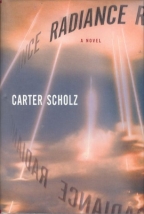Radiance
Carter Scholz
Picador / St. Martin's Press
US Hardcover First
ISBN 0-312-26893-9
Publication Date: 02-01-2002
388 Pages; $24.00
Date Reviewed: 02-25-03
Reviewed by Rick Kleffel © 2003

REFERENCES
COLUMNS
|
|
|
RadianceCarter ScholzPicador / St. Martin's PressUS Hardcover FirstISBN 0-312-26893-9Publication Date: 02-01-2002388 Pages; $24.00Date Reviewed: 02-25-03Reviewed by Rick Kleffel © 2003 |
|
|
REFERENCES |
COLUMNS |
In the troubled days at the close of the last century the stuff of what had once been science fiction became the concern of people working in a high-pressure workplace. In 'Radiance', Carter Scholz gives us a harried, pressurized point of view into the mind of a man who is promoted to manage an unmanageable project. A tiny cog in a government bureaucracy, Philip Quine is the physicist who cries 'Wolf!', the man who stands up for the truth is a sea of shifting reality. He's sucked by forces beyond his control into a whirlwind of compromise, revenge, petty satisfactions and haunting failures. From the dawn of the dot-com age comes this tale told long after the crash. Looking into our past, Carter Scholz allows the reader to intuit the future. 'Radiance' is a daring, challenging work that slips by the reader in a chaotic scream of symbols, satire and self-loathing. In case you haven't gazed too long into the abyss, Scholz has a road map into the darkness. He's got the chaos at the edge of complexity and he can spray you with a high-power hose of words, images and concepts.
In a sense, the story of 'Radiance' is another timeless incarnation of the Peter Principle, which states that workers will be promoted until they reach their level of incompetence, at which point they'll remain entrenched to screw up the working lives of everyone in their general vicinity. Philip Quine is a physicist with scruples, and he's not willing to stretch the truth sufficiently to justify the life of a top-secret project straight out the Reagan era star wars concept. His space-based laser isn't, cannot live up to the sales pitch it's been given by his boss, the manic, Machiavellian Leo Highet. With one girlfriend going, another coming, and the world dissolving into a word-etched media-mediated chaos, Quine is promoted to a managerial position after Highet's Last Stand.
Scholz is a stylist, not a straightforward plot-driven writer. The story is told in impressionistic washes of imagery and prose. The style is immersive and enfolding, as much poetry and rhythm as it is novelistic. Like Chuck Palahniuk, Scholz writes in rhythmic repetitions that layer the reader in Quine's and Highet's reality. The first portion of the novel is told from Quine's point of view. Philip is something of a self-served victim, whose reliability erodes as the narrative proceeds. When Scholz switches to Highet's point of view, it's a bracing change of pace. Highet is schemer, a pushy manipulative man who still feels the power of principles and scruples as muscular tissue moving beneath the layers of his own oily self-interest. It's a fascinating and daring tactic that really works to break up the novel and skewer the reader's take on Philip Quine.
For all the intricate emphasis on character building and prose poetry, 'Radiance' manages to pack in a wide range of scientific and social speculation in a cleverly re-worked retroactive fashion. The reader is put front and center in the company of real scientists speculating on what was believed possible only ten years ago. It was science fiction then, and it still is now, but the years of development in between the two allow the reader a unique perspective on the science and the speculation. For the serious reader of science fiction, 'Radiance' is a hall of mirrors that gets to the heart of how science actually progresses as it imagines its own future, which is in fact our past.
'Radiance' doesn't provide the neat and tidy ending that one might expect a novel about weapons development would have. There's no huge explosion to punctuate the narrative, there's no final speechifying. This isn't to say there aren't (test) explosions or (satirical) speeches. 'Radiance' is shot through with hilarious worst-case-at-work scenarios, a sort of 'Dilbert' for the defense industry. The lessons of the high-tech boom und krash, the sturm und drang of the ever expanding, then contracting economic universe provide for a buffet steam-table full of observations that strike home like an ice pick to the heart to anyone who has ever written an employee review. The wild world of the middle manager rushes by like signs on the freeway and comes crashing into life in 'Radiance'.